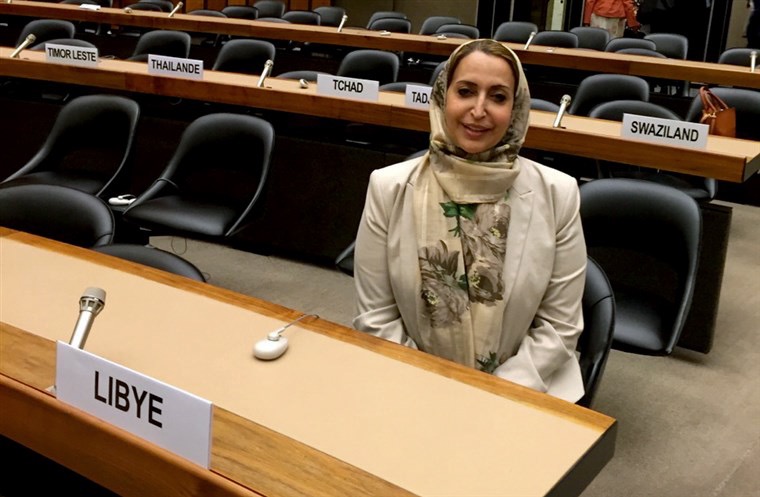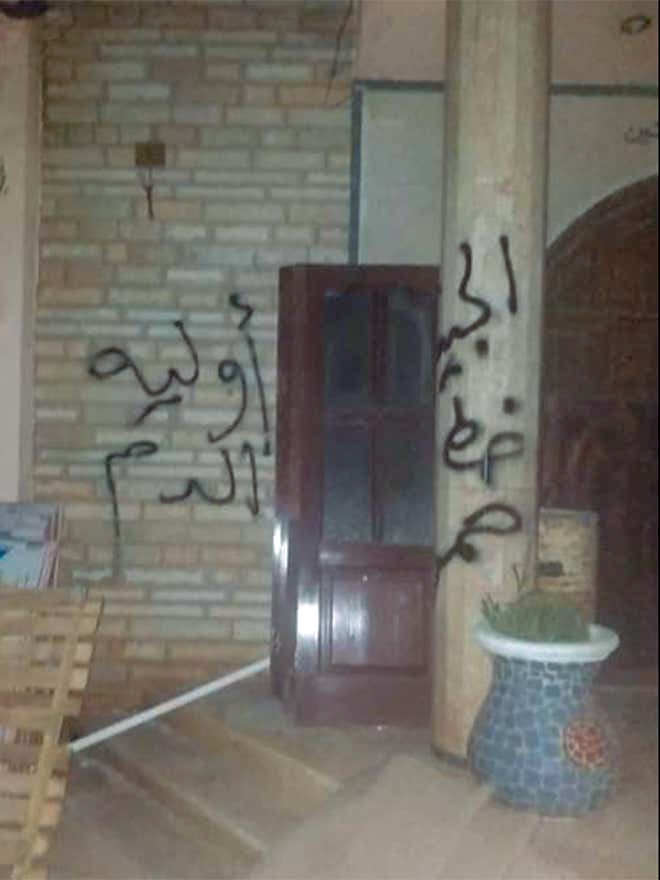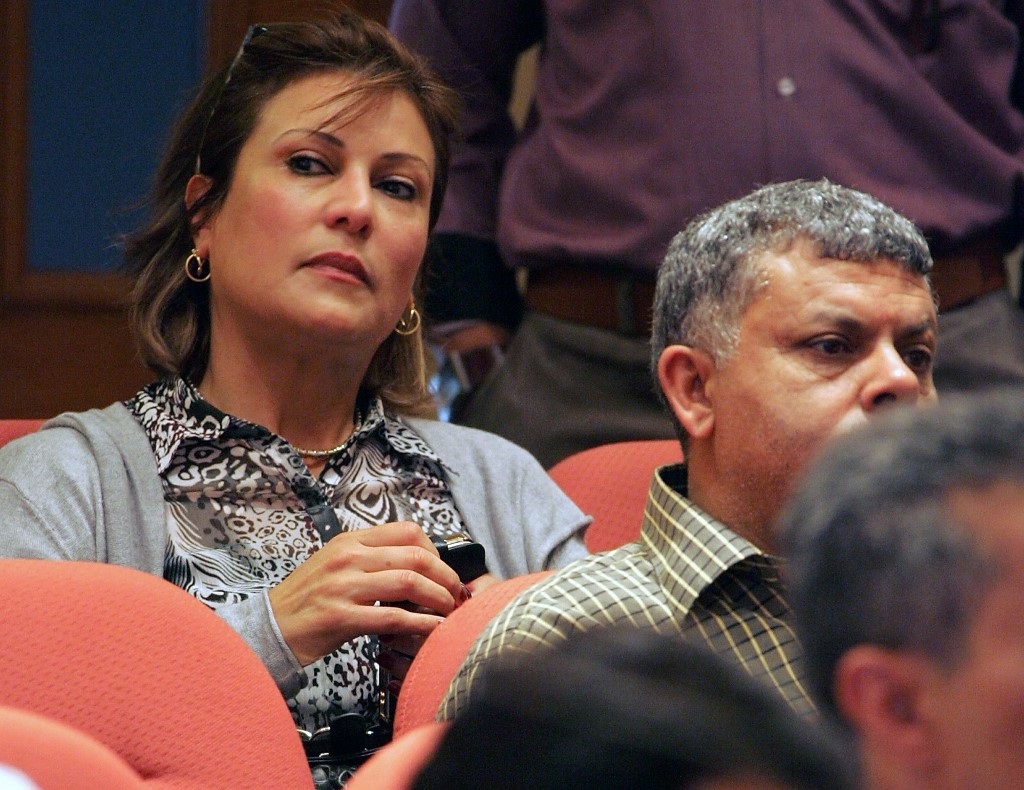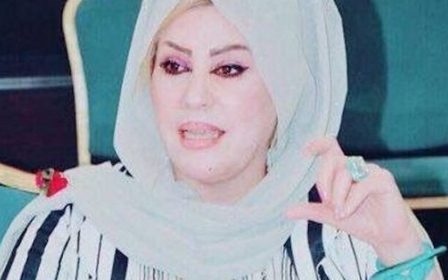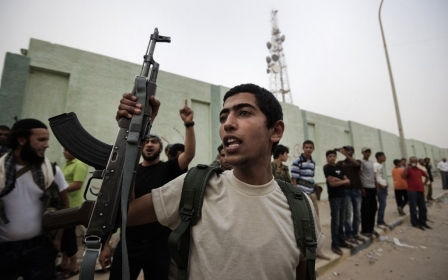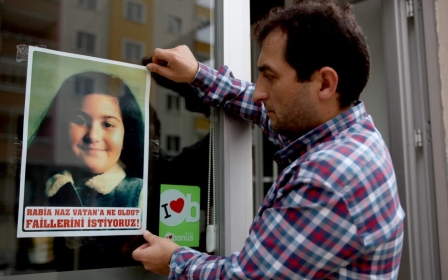‘I don’t believe my sister is alive’: Fears mount for kidnapped Libyan MP Seham Sergiwa
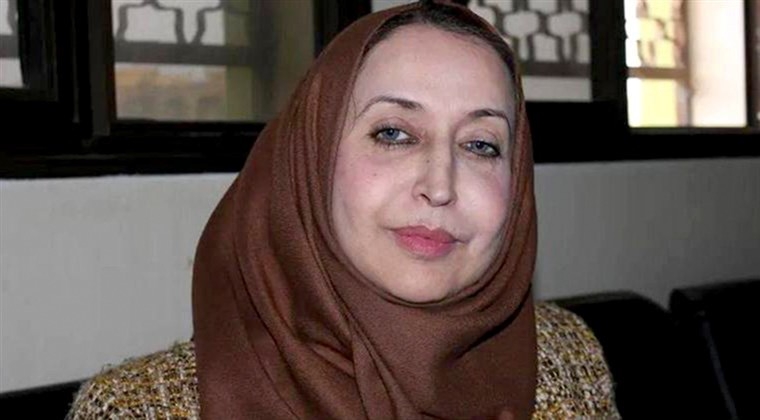
The family of one of Libya’s most prominent female politicians believe she was killed hours after she gave a TV interview criticising eastern Libyan military commander Khalifa Haftar’s offensive on Tripoli.
'I don’t believe my sister is alive. We believe she was killed on the night she was abducted by Haftar’s forces'
- Adam Sergiwa, brother
Seham Sergiwa, an elected member of the House of Representatives, a parliament set up in the east of the country, has not been heard from since 17 July when family members and eyewitnesses say masked men, allied with Haftar’s self-styled Libya National Army, dragged her from her Benghazi home.
The men, clad in military uniforms, stormed her house after Sergiwa appeared in a news interview and criticised the direction Haftar, a former CIA asset, was taking the country.
New MEE newsletter: Jerusalem Dispatch
Sign up to get the latest insights and analysis on Israel-Palestine, alongside Turkey Unpacked and other MEE newsletters
“It’s been months since she disappeared and we are yet to hear anything on her whereabouts,” her brother Adam Sergiwa told MEE.
“I don’t believe my sister is alive. We believe she was killed on the night she was abducted by Haftar’s forces.”
Sergiwa had been among a group of MPs who had publicly urged Haftar to end his military operations against the UN-recognised Government of National Accord (GNA) in Tripoli.
In April, Haftar and his supporters launched an offensive to "cleanse" the capital of what he called "terrorists" – an operation which has killed at least 1,000 people and displaced around 120,000, according to the World Health Organisation.
Hours before her kidnapping, Sergiwa gave an interview to the Arabic language Al Hadath TV, in which she criticised the Tripoli offensive which has upended UN-led plans to broker a political settlement in the country.
In the interview, Sergiwa, who holds a PhD in psychology from the University of London, called on both parties to reconcile and establish a unity government.
Responding to the interviewer’s claim that the members of the GNA were from the Muslim Brotherhood and had links with al-Qaeda and the local branch of the Islamic State, Sergiwa said Haftar’s supporters included “extremists”.
“Don’t you also have extremists on the other side supporting the LNA? Even the extremists on the other side have the right to participate,” she said.
'Playing games with us'
An eyewitness to Sergiwa’s abduction told MEE that her abductors carried advanced weaponry and sped off in cars marked with “military police”.
After the raid, the words Awliya al-Dam, meaning “avengers of blood”, were found graffitied on a wall inside the house, the witness said.
Awliya al-Dam is a militia affiliated with the LNA, whose members are relatives of people killed fighting so-called “terrorists” in Benghazi.
Since their inception in 2014, they have blamed Tripoli-aligned groups for assassinating members of their tribe.
However according to right groups, they themselves have been accused of carrying out extra-judicial killings and looting and burning down homes.
Some of the militia's members and other LNA units include adherents of the Saudi Salafist Madkhali ideology that view Haftar as their “ruler” to whom they owe “complete obedience".
Tarek El-Kharraz, a spokesman for the Benghazi-based government’s interior ministry, denied any involvement by Haftar’s forces in her disappearance. He told MEE that an investigation was ongoing to determine Sergiwa’s whereabouts.
“Pro-Haftar elements and TV channels have been saying that they are not responsible for her disappearance ... and even that she has been released - but there is no truth to these claims at all,” Adam Sergiwa said.
“They (the LNA) are playing games with us [her family] and the international community to try and diffuse the situation.
“Meanwhile, political activists are constantly going missing only for their bodies to appear in the streets a few days later as a sign to Libyans that they should not question Haftar’s authority .... this is the case with my sister.”
Nearly three months after her abduction, no group has claimed responsibility or demanded a ransom.
According to the Sergiwa family and several residents with whom MEE spoke, the threatening message: “don’t cross the line of the army” spray-painted on one of the walls of the house was an admission of the LNA’s involvement.
“Sergiwa appears to have come under attack for peacefully expressing her opinions and criticising the Libyan National Army’s offensive on Tripoli,” Magdalena Mughrabi, the Middle East and North Africa deputy director at Amnesty International said in a statement shortly after her disappearance.
“The LNA, which controls Benghazi, must ensure Sergiwa’s immediate and unconditional release, and refrain from any attacks against civilians.”
Targeted women
Libya has been mired in chaos since the 2011 NATO-backed uprising that toppled and killed longtime leader Muammar Gaddafi.
A series of governments have failed to demobilise and reintegrate militias that had risen to prominence during the revolution.
The United Arab Emirates, Egypt, and other foreign powers including the US have lent strong support to Haftar, who has portrayed himself as a powerful figure who can deliver stability to Libya and crush armed groups.
However, Sergiwa is the latest in a series of Libyan women who have been targeted with assassination, attempted killings, physical assault and sexual violence in areas controlled by Haftar.
At least three female activists and politicians have been assassinated since 2014 in connection with their work - including Salwa Bugaighis, a renowned activist who had been an internationally recognised face of the 2011 uprising.
A few weeks after Bugaighis' death, gunmen shot dead Fariha al-Barkawi, another women’s rights campaigner who had protested Bugaighis’s murder.
“The worst nightmare of an authoritarian like Haftar is displays of dissent, even individual, because these can quickly evolve into widespread expressions of unrest and revolt,” Emad Badi, a non-resident scholar at the Middle East Institute told MEE.
'The goal is to scare everyone into displaying solidarity towards the LNA and to its military adventure'
- Jalel Harchaoui, Clingendael Institute
“Awliya al-Dam feel entitled to do what they want and will silence any voice they feel is critical of Haftar and his ‘Operation Dignity’.”
Haftar, a former general under Gaddafi’s regime, lived in exile in the US for 20 years but returned to Libya following Gaddafi’s demise.
He has vowed to continue his offensive on Tripoli, but so far his military operation has failed to achieve any of its stated objectives, with his eastern-based forces struggling to break through the GNA’s front lines along the capital’s southern outskirts.
Jalel Harchaoui, a research fellow at the Netherlands' Clingendael Institute, told MEE: “If a public figure voices any kind of criticism of the war effort, which is reaching the 180-day mark, the reflexive response of the LNA and pro-LNA brigades consists in simply cracking down on dissent.
“The war effort has cost hundreds of lives ... and the crackdown happens to be harsh because the goal is to scare everyone into displaying solidarity towards the LNA and to its military adventure," he said.
Middle East Eye delivers independent and unrivalled coverage and analysis of the Middle East, North Africa and beyond. To learn more about republishing this content and the associated fees, please fill out this form. More about MEE can be found here.


